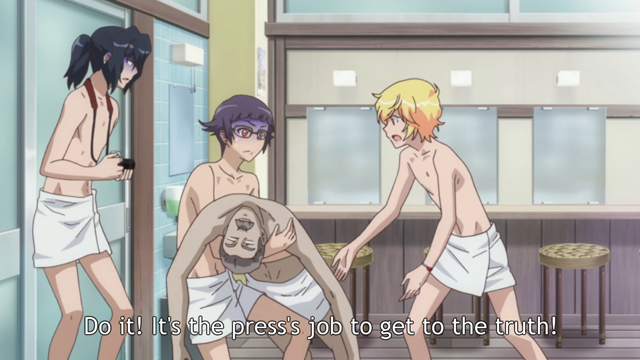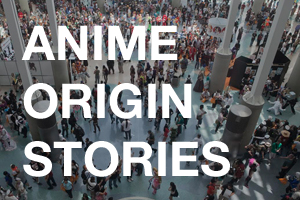
In their quest to seek out the truth, journalists often have different motivations than the people around them, and are seen as nosy and meddlesome. When they’re portrayed in anime, they are typically wildcard characters, always primed to upset the status quo.
As a journalist myself, I love seeing journalist characters in anime, so I loved last week’s Cute High Earth Defense Club LOVE!, which introduced one as a villain. This lighthearted show depicted Kinosaki as a pretty incompetent reporter, and his manner and carriage as a journalist makes a great master list of things a real journalist ought to never do.
 His introduction was neither here nor there. Kinosaki notes that the Press Society publishes their articles online, much to the main characters’ surprise. This isn’t just a commentary on the modernization of news, but on the democratization of it. Now that anyone can put news online as a blogger, readers have to work harder to determine the accuracy of the news they read. Japan has one of the highest print readerships in the world, and this detail that Kinosaki’s work isn’t in print might work against the perceived legitimacy of his reporting.
His introduction was neither here nor there. Kinosaki notes that the Press Society publishes their articles online, much to the main characters’ surprise. This isn’t just a commentary on the modernization of news, but on the democratization of it. Now that anyone can put news online as a blogger, readers have to work harder to determine the accuracy of the news they read. Japan has one of the highest print readerships in the world, and this detail that Kinosaki’s work isn’t in print might work against the perceived legitimacy of his reporting.

“…But to root out the truth and convey it in elaborate, minute detail… I believe that is our mission.” This uncomfortable comment touches the core of everything people don’t like about journalists, and why they make such great villains. Kinosaki sees the truth as something that people are hiding from him, something that has to be extracted by force.



“Consent? Who gave it?” our heroes exclaim. Kinosaki replies that the club thought that his story sounded like a good idea, and he interpreted it as consent. This is actually a really sensitive struggle in journalism—when does public interest outweigh a citizen’s privacy? Obviously, Kinosaki doesn’t care about the Defense Club’s privacy.

It’s interesting he uses a computer term instead of saying “readers.” To an extent, this is true, which is why it’s difficult to tell if a story will go viral or not. However, even if readers would find it interesting to read about something, journalists also have a duty to their sources (especially when they are private citizens) to portray them accurately and with their consent.


Kind of a crazy claim to make in this situation. Japan enjoys a free press but obviously, you’d claim that it in order to write critical articles that powerful people or companies would rather have censored, not to bully private citizens.

Yeah, you don’t want to ambush people. This is a paparazzi tactic.

This is what we’d call a leading question, one that “subtly prompts the respondent to answer in a particular way. Leading questions are generally undesirable as they result in false or slanted information.”

It’s important to preserve the spirit of what people say, rather than the letter. it’s why you wouldn’t publish typos in an email statement to the press, or crop somebody’s statement so much that it’s indistinguishable. With audio, you can make it sound like somebody is for anything—my favorite example is when Obama’s speeches were cut to make it sound like he’s singing the Pokémon song.

“Naked boys? The public needs to know!”
When asked to refrain from taking pictures in the bath, Kinosaki plays dumb, asking if this is a public place or not. Generally, journalists in a nation with a free press are said to have access to any place citizens have access to. Obviously here, citizen’s privacy clearly outweighs public interest!

Another clear example of overreach. Also, what kind of technology do these high school students have at their disposal?
Well, two can play this game apparently!
Have you ever seen your profession exaggerated or misconstrued in an anime to hilarious results? I’d love to hear what teachers think of Assassination Classroom, waitstaff think of Working!!, bartenders think of Death Parade, etc.
Discover more from Otaku Journalist
Subscribe to get the latest posts sent to your email.




